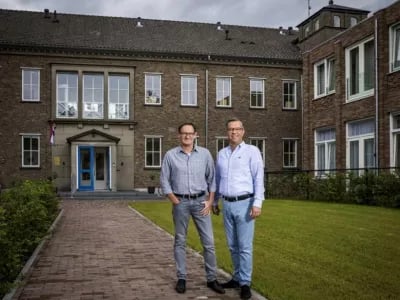Het Gastenhuis offers affordable residential care for people with dementia, in a homely atmosphere and at central locations. Every house is managed by a ‘care couple’ with healthcare experience, living next door. For the last eight months, Gastenhuis Deurne has been run by Petro Klompen and Oswald Verleg, who previously worked as nurses at the Máxima Medical Centre in the Hague. They told us about their transition from that strictly regulated work environment to one that involves constant improvisation.
‘The key is to keep seeing people with dementia as multifaceted human beings, to respect them as the individuals that they are’
The Gastenhuis Deurne is based in a beautifully renovated former school at the edge of the village, in the Dutch province of NoordBrabant. Sunlight envelops the lobby through the tall windows, and the atmosphere is more reminiscent of a fashionable Amsterdam hotel than of a care facility. Here, Petro Klompen and Oswald Verleg lead a team of 23 employees, who through their combined efforts offer a loving home to 22 people with dementia. For Klompen and Verleg, it was a big step. Although they have been in a romantic partnership for more than 25 years and used to work for the same employer (albeit in different departments), they had not worked together intensively on a daily basis before. “Fortunately, we know each other thoroughly and we know we can rely on each other”, Verleg said. “We can often tell what the other person needs just from a look. We each know where our strengths lie and what we don't excel at, and we can support each other.”
The intensity of their collaboration is evidenced by the fact that Klompen and Verleg do almost all their most important work together. “All the job interviews with new employees and making the acquaintance of new potential residents, we do together”, Verleg said. “My background equips me to handle the administrative side of things – welcome to the healthcare industry – but the substantive discussions we do together. Is there a match, would this person fit in here? Fortunately, we tend to have the same intuitions where that is concerned. We offer residential care without psychological treatment. For us, the essence is that people must be given a chance to land here and lay down roots. That means our residents have a high degree of control over their lives, they are part of a residential community and they need to experience a level of safety and comfort. If we took in someone with complex behavioural problems, it would damage the quality of life of the other residents.”
Klompen: “We sometimes have difficult conversations with families about whether we can offer the right type of residential care for their elderly father or mother. But we want to maintain our open door policy, and that means there will be some people that we're unfortunately not equipped to accommodate.”
Getting your hands dirty
Verleg and Klompen also take care of the tours for potential residents and their immediate family members together. One of their strengths is that they have a great deal of experience working in dementia care, and as such, they are well aware of all the things going on in the background. “We can tell that our expertise in communicating with potential residents and their caretakers puts family members at ease. We make them feel that we understand the psychological difficulty of moving somebody into a care facility. That decision is often linked to all sorts of doubts and feelings of guilt: is this the right thing to do? Will my mother or father be able to cope with the change?” Verleg said. Klompen added: “At the end of every intake, we try to address every family member by their first name and try to impress upon them: please take care of yourselves as well. This is a process of mourning in its own right. You're entering into a new phase that makes all sorts of demands on your family, and you're trying to do the best you can. People often get quite emotional when we recognise that.”
Both men also frequently take a shift of regular care work, not just to maintain relationships to their team members and residents, but also to make adjustments in the daily planning where necessary. Verleg: “I always say: it's the workers who determine whether an organisation succeeds. And we believe that we also need to get our hands dirty. We all manage a household together, with everything that entails. I won't hesitate to put on some rubber gloves and clean the toilets. In a place like this, we would fall off our pedestal as team leaders very quickly if we didn't contribute.” Klompen: “But of course, we are not perfect. Sometimes we also understand that we made a mistake and need to handle something differently next time.”
Strict procedures
When asked whether it is difficult for them to find qualified workers in the notoriously short-staffed industry, Klompen said: “Even before we had really started, our mailbox exploded with applications – we got so many that we had to turn down some excellent people. Now, things are a little more difficult, but I don't think we can complain. People coming and going is inherent to starting something new. Some professionals find it difficult to embrace our way of working: they are used to following strict procedures, spending 15 minutes per client, having standard toolkits with standard equipment. But things are different here. People have their own apartments, and they decide themselves what's in their bathroom cabinets. And if they don't want to get out of bed until 10:30, that is fine with us. The residents host us in their apartments, rather than the other way around.” Verleg added: “No matter how careful you are in the hiring process, sometimes you just don't match, and you are better off parting ways. We also had to let people go who had management experience and who found greener pastures elsewhere. As far as that is concerned, we are just like any other company.” Although Verleg and Klompen admit that they are sometimes buried in work ‘up to their eyeballs’, they can't imagine themselves anywhere else. “Dementia care is a fascinating world. Not a single day is the same. We start every day with a massive to-do list, and over the course of the day, we complete it, with joy and good humour and a lot of improvisation. And we celebrate the small, unexpected things that happen,” said Verleg. “Like a resident who is usually quite grumpy, and who one day gets up and enthusiastically sings Happy Birthday for a fellow resident. And that person said it was the best birthday of her life. Those wonderful moments are why we continue to be drawn to this work.”
Klompen: “By now, we have accepted that not every day is perfectly harmonious. Some nights, we're here having dinner and everybody's complaining, residents get annoyed with each other and they clash. In the beginning, that worried us. But in reality, it is fine that conflicts happen. It's part of life, people need that kind of stimulus, too.” Recently, Klompen and Verleg had to say their first goodbyes to a resident who had passed away in the facility. “We organised a lovely ceremony for him here, with all the residents together,” Klompen said. “We paid our respects together as he was carried out the front doors. We welcome new residents in the same way, literally rolling out the red carpet for them. The key is to keep seeing people with dementia as multifaceted human beings, to respect them as the individuals that they are, with their profound histories and moving stories. It is a powerful thing to connect to them and give them small moments of happiness at this stage of their lives. It makes our profession a beautiful one.”













